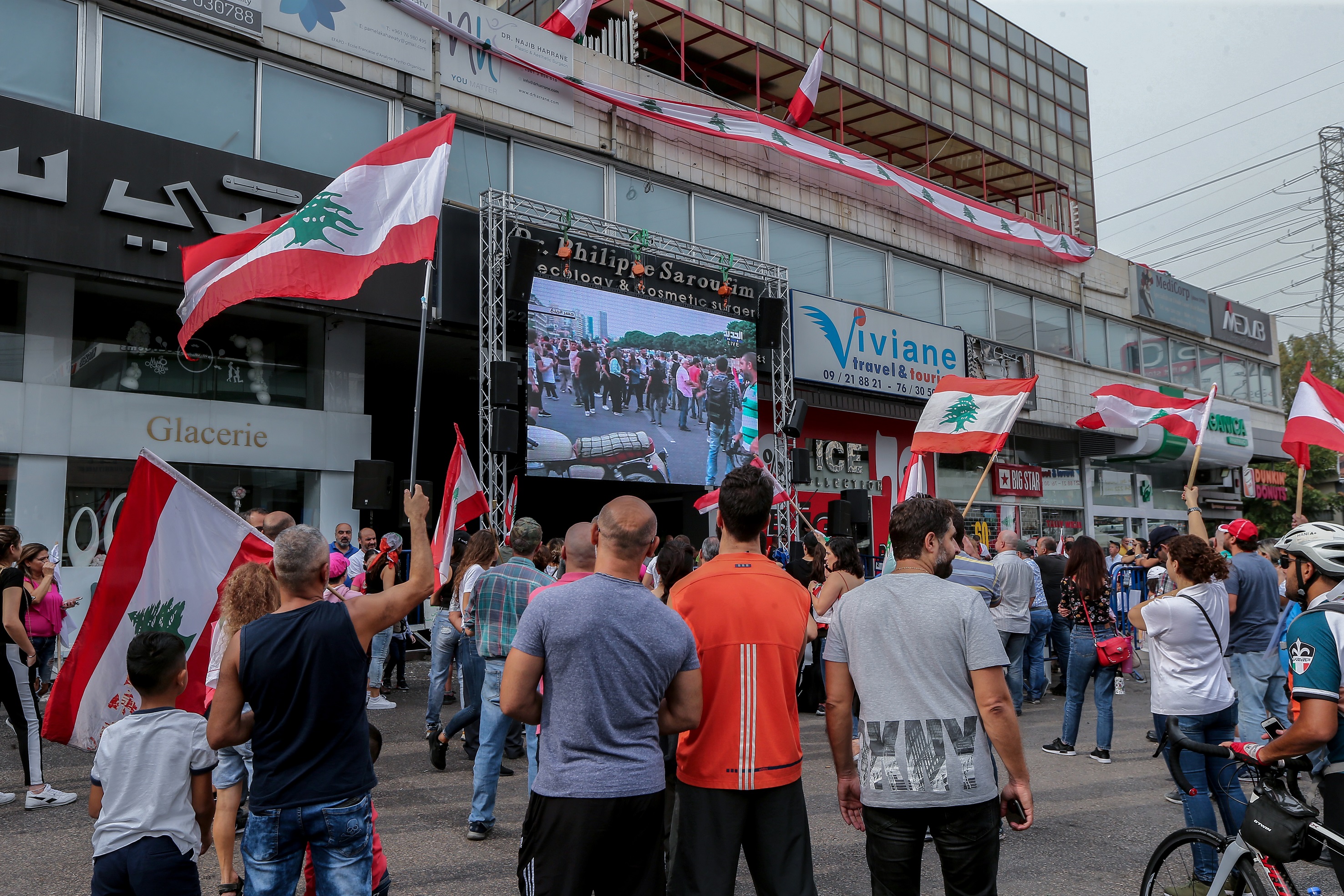لا يشبه المشهد اللبناني في دوافعه بعد انتفاضة الشارع يوم 17 أكتوبر/تشرين الأول 2019، مشاهد الانتفاضات الشعبية في محيطه العربي. لقد شكلت فضائح الفساد سببًا مباشرًا في انتفاضة المصريين، حيث أظهرت مجموعة من الدراسات أن "الصحافة لعبت دورًا في فضح الفاسدين وتوعية الجمهور المصري بخطورة انتشار الفساد، وهو ما كان سببًا في اندلاع ثورة 25 يناير" (1).
في لبنان، جاء الحراك الشعبي ليطلق مفهوم "السلطة الفاسدة"، وينسحب هذا المصطلح على وسائل الإعلام. إعلام أخذ جزء منه على عاتقه خوضَ معركة الكشف عن الفساد، وجزء آخر ما يزال يغض الطرف عمدا ويتكتم عن الفساد، بل ربما يحميه. في بلد يقال فيه إن السلطة الرابعة تجلٍّ للسلطة السياسية، أو في أفضل الحالات هما مرتبطتان بمصالح مشتركة، يسعى الإعلام إلى حماية استمراريته في كنف المال السياسي.
في إطلالة سريعة على الإعلام بلبنان، نجد أن الصحف الأشهر إما انتهت مثل جريدة "السفير"، أو تحتضر مثل جريدة "النهار". أما المرئي والمسموع، فمنذ حوالي سنة أغلق تلفزيون "المستقبل" المملوك لآل الحريري لأسباب مالية، فخفَتَ ما عُرف بأنه إعلام الطائفة السنية، بينما تكافح قناة "أو.تي.في" (OTV) التابعة للتيار الوطني الحر من أجل جذب جمهورٍ يتجاوز أولئك الموالين للحزب.
ينقسم المشهد الإعلامي عموديًّا بين قناتي "المنار" التابعة لحزب الله و"أن.بي.أن" (NBN) التابعة لحركة أمل، وبين الخصم الأيديولوجي قناتي "أل.بي.سي" (LBC) ممثلة يمين الوسط و"أم.تي.في" (MTV) ممثلة أقصى اليمين (2). ينطوي هذا التقسيم على غطاء حزبي طائفي مذهبي، بينما وحدها القناة الرسمية المعروفة باسم "تلفزيون لبنان" لا تنتمي إلى أي من الأحزاب السياسية اللبنانية. لكن المفارقة أن هذه القناة هي المحطة الوحيدة التي لا تغطي الأحداث، و"غابت عنها الاحتجاجات المستمرة" (3)، وكأن الأمر يقع في بلد آخر غير لبنان.
وبين القنوات التلفزيونية الحزبية الناطقة باسم الزعماء السياسيين، تحضر قناة "الجديد" التابعة لرجل الأعمال تحسين خياط، الذي ورد اسمه ضمن "وثائق بنما" ضمن تحقيقات عن شخصيات عالمية كشفت نشاطاتها المالية في التهرب الضريبي.
فكيف يمكن لهذه المحطات التلفزيونية -وإن رفعت شعارات مكافحة الفساد وكشف الفاسدين- أن تتجاوز مصالحها الاقتصادية وارتهاناتها السياسية؟
جاءت نتائج تقرير مؤشر الفساد للعام 2019، الصادر عن منظمة الشفافية الدولية، لتعري فداحة الفساد. يقول التقرير إن "لبنان يقع في المرتبة 137 عالميا من أصل 180 دولة" (4). هذا المؤشر لم يختلف كثيرا عن مؤشرات الأعوام السابقة، فقد كشف مجددًا أن لبنان لا يزال يفشل في معالجة آفة الفساد بفعالية. لقد وجد اللبنانيون أنفسهم في العام 2020 أمام أسوأ أزمة اقتصادية وإنسانية منذ الحرب الأهلية عام 1990.
وبما أن الفساد قد نخر الكيان اللبناني، فلا بدّ أن نتساءل عن دور الإعلام طيلة هذه الفترة في معالجة هذا الملف. تعتبر دراسة صادرة عن جامعة بيروت الأميركية حول أخلاقيات الإعلام، أن ما يشاع عن أن الإعلام اللبناني هو الأكثر حرية في المنطقة العربية؛ هو مجرد خرافة. وتكمل الدراسة بأن حرية الإعلام في لبنان مقيدة مثل حال الإعلام في الدول العربية الأخرى، والفرق الوحيد هو أن القيود المفروضة على وسائل الإعلام اللبنانية تأتي إما من رؤساء الأحزاب والطوائف وإما من رجال الأعمال. ففي لبنان تغيب سلطة الدولة نسبيا على وسائل الإعلام، لأنه ليست لديه حكومة "حقيقية" بحسب الدراسة، وإنما تسيطر عليها الأحزاب الطائفية، وعادة ما تكون سلطة هؤلاء الرؤساء أكثر من سلطة المؤسسات الرسمية (5).
الإعلام والفساد و17 أكتوبر
قبل 17 أكتوبر/تشرين الأول 2019، كانت المحاولات الصحفية لكشف الفساد خجولة. يقول رياض قبيسي الذي بدأ رحلته في كشف الفساد عام 2013، في مقابلة صحفية "إن الأثر الذي أحدثته الحلقات منذ بداية الانتفاضة يفوق ما أنجزته هذه السنوات الستّ مجتمعة" (6). ففي ذلك الوقت لم يتحرك القضاء ولا الرأي العام، ثمّ حلّت لحظة 17 أكتوبر الشعبية التي فرضت واقعًا جديدًا على المؤسسات الإعلامية. حوّلت هذه المؤسسات عملها إلى تغطيات مفتوحة على مدى أيام بل أسابيع، بعدما أدركت أن الرأي العام بات يبحث عن أدوات لكشف فساد السلطة السياسية. هنا فقط انقلب الإهمال الإعلامي -على مدى أعوام- لقضايا الفساد المستشري إلى محاولات جادة، ومن مواضيع متفرقة ومشتتة إلى تقارير شبه يومية وتفصيلية، بدءًا من قضية مطار رفيق الحريري الدولي، ومرورا بملفات الصفقات المشبوهة وهدر المال العام في قطاعات الطاقة والكهرباء والصحة وصناديق التقاعد وغيرها.
غير أن المفارقة تكمن في أن هذه القضايا لم تلق متابعة حثيثة ومستمرة، لا ممن أثارها في أول الأمر، ولا من بقية وسائل الإعلام، الأمر الذي جعل عملية الكشف عن الفساد في الإعلام اللبناني غير كافية؛ فقد اتسمت بالانتقائية، حيث تختار كل قناة ما يناسب توجّهها من القضايا، مخفيةً وراءها غاياتٍ سياسية وفقًا لنظرية حارس البوابة. وما يدلّ على ذلك أن متابعة قضية واحدة على الأقل لم تُفض إلى نتائج مؤثرة على الرأي العام الذي يدرك –ربما- أن توزيع الاتهامات بين بعض القنوات ليس بريئًا. فلطالما "استخدمت الأحزاب السياسية المختلفة لسنواتٍ هذه المحطات المتبقية كمنافذ دعائية لها. وقد جاءت تغطيتهم لاحتجاجات الانتفاضة الشعبية للتأكيد على موقفهم المتورط" (7)، وهو ما أثبته التفاوت في المعلومة وفي التفاعل مع منصات التواصل الاجتماعي الأكثر حرية، فكان أن "عاد مصطلح صحافة المواطن إلى الواجهة لسرعته في تبادل المعلومات ومقاطع الفيديو، ولنقل ما يرون أن الإعلام التقليدي يتجنب عرضه" (8).
هذه العوامل جعلت الجمهور يفقد تدريجيًّا ثقته في الصحافة، خاصة مع الانتشار الواسع الذي حققته صفحات لناشطين ومنظمات وهيئات مجتمع مدني، مثل "لبنان ينتفض"، و"ميغافون"، و"بيروت مدينتي"، و"لحقي" وغيرها الكثير. في هذا الصدد، أشارت منظمة "المفكرة القانونية" إلى دور الإعلام البديل في حلقة من البودكاست القانوني بعنوان "الإعلام والسلطة في لبنان" على صفحتها على فيسبوك، إذ تحدثت عن "ظهور انشطار أساسي في الجسم الإعلامي بين ما يُشار إليه بالإعلام التقليدي، وما بدأ يبرز في العلن كإعلام بديل يتكتل ويتضامن ليخلق تيارًا مستقلا من الإعلام، بعيدًا عن التجاذبات السياسية والارتهان للسلطة والنظام، ويعتمد مقاربة نقدية إزاء هذه السلطة وهذا النظام" (9).
وهكذا، بقيت محاولات بعض القنوات للظهور كممثلة للصالح العام خجولة ودون تطلعات الشارع، إلى حين الانفجار الكبير.
انفجار بيروت
إنه انفجار الرابع من أغسطس/آب 2020 في مرفأ بيروت. بطبيعة الحال، أَوْلى الإعلام اللبناني اهتمامًا كبيرا بالتطورات، مُظهرًا في هذه الفترة حرصه على الصالح العام من خلال محاولات الكشف عن مكامن الفساد، وإن سعت كل وسيلة إلى ذلك بما يتناسب وسياستها العامة. لم تكن هذه الصورة خيارًا، فقد وجدت وسائل الإعلام نفسها أمام كارثة أفجعت اللبنانيين وولّدت ردود فعل غاضبة لدى الرأي العام ومنظمات المجتمع المدني، وحتى لدى المنظمات الدولية، فلم يعد لديها القدرة على التجاهل أو التلاعب بالأولويات.
إن التصدي للفساد بواسطة الإعلام يطرح إشكالية ثنائية: دور الصحفي، ودور المؤسسة التي يعمل فيها. "ما يمكن أن يعيق مثل هذه الشِّرعات هو تبعية المؤسسة الإعلامية لقوى سياسية أو مالية، الأمر الذي يجعلها في خدمة تلك القوى ويُفقدها جزءًا كبيرًا من حرية قرارها" (10).
وقد أضعف النظام الرقمي قدرة الإعلام التقليدي على التأثير في الرأي العام رغم كل محاولات الإعلام اللبناني لكشف الفساد، لأن المادة الإعلامية لم تعد ذات أثر في المجتمع نظرًا لارتباطاتها السياسية والمالية المسيطرة عليها منذ نشأتها. وقد يُستثنى من ذلك بعض الأسماء الصحفية من العاملين ضمن هذه المؤسسات، وهذا النوع لا يزال قيد التطور في لبنان رغم بعض المحاولات البسيطة التي بدأت بالظهور، خاصة مع تعاظم دور وسائل التواصل الاجتماعي.
[1] "الإعلام ومكافحة الفساد"، بحث مقدم للمؤتمر العلمي السنوي العاشر الذي تقيمه كلية الحقوق بجامعة طنطا، أبريل/نيسان 2017.
[2] Kraidy Marwan, The Lebanese Rise Up Against a Failed System, https://online.ucpress.edu/currenthistory/article/118/812/361/107537/The-Lebanese-Rise-Up-Against-a-Failed-System
[3] Lteif Diala, The Lebanon Revolution Takes on The Media: A Resource on Alternative News Outlets, Jadaliyya.com
[4] https://www.transparency.org/ar/news/cpi-2019-global-highlights
[5] Dajani Nabil, Ethics and the Media: The Lebanese Experience, Conference on Bioethics in the Media Salim El-Hoss Bioethics and Professionalism Program, AUB Faculty of Medicine December 11, 2012
[8] https://www.bbc.com/arabic/middleeast-50263090
[9] https://www.facebook.com/LegalAgenda/posts/4332266563457745/
[10]دليل "الصحافة الإصلاحية.. دور وسائل الإعلام في مكافحة الفساد ...








































